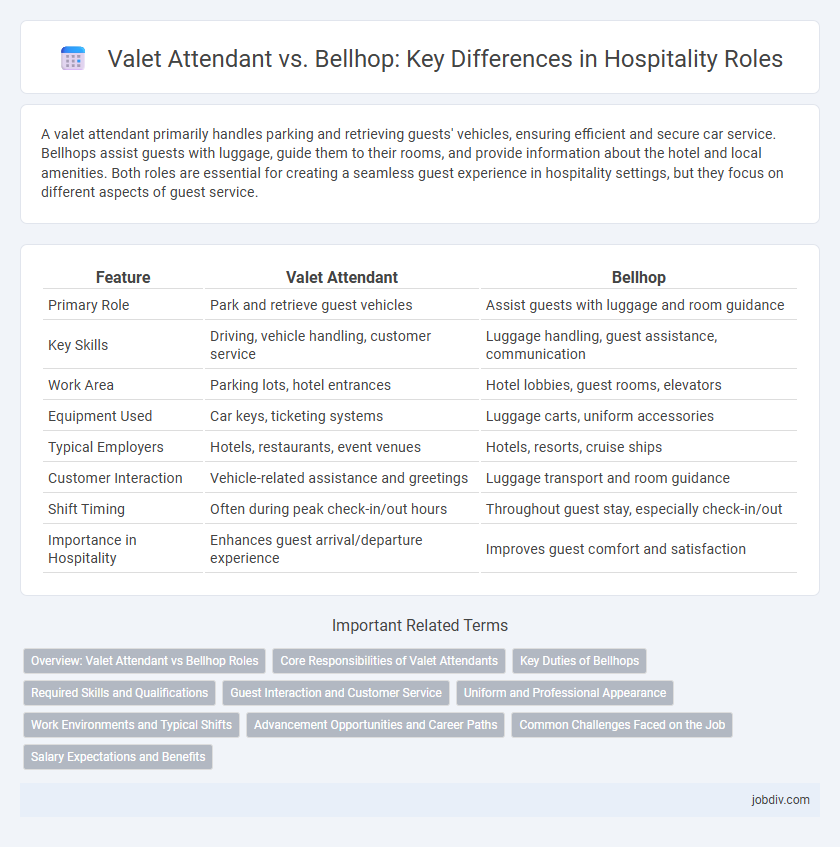A valet attendant primarily handles parking and retrieving guests' vehicles, ensuring efficient and secure car service. Bellhops assist guests with luggage, guide them to their rooms, and provide information about the hotel and local amenities. Both roles are essential for creating a seamless guest experience in hospitality settings, but they focus on different aspects of guest service.
Table of Comparison
| Feature | Valet Attendant | Bellhop |
|---|---|---|
| Primary Role | Park and retrieve guest vehicles | Assist guests with luggage and room guidance |
| Key Skills | Driving, vehicle handling, customer service | Luggage handling, guest assistance, communication |
| Work Area | Parking lots, hotel entrances | Hotel lobbies, guest rooms, elevators |
| Equipment Used | Car keys, ticketing systems | Luggage carts, uniform accessories |
| Typical Employers | Hotels, restaurants, event venues | Hotels, resorts, cruise ships |
| Customer Interaction | Vehicle-related assistance and greetings | Luggage transport and room guidance |
| Shift Timing | Often during peak check-in/out hours | Throughout guest stay, especially check-in/out |
| Importance in Hospitality | Enhances guest arrival/departure experience | Improves guest comfort and satisfaction |
Overview: Valet Attendant vs Bellhop Roles
Valet Attendants primarily handle parking and retrieval of guests' vehicles, requiring skills in safe driving and vehicle management. Bellhops focus on assisting guests with luggage, guiding them to rooms, and providing general hospitality services within the hotel. Both roles enhance guest experience but emphasize different operational responsibilities and guest interaction points.
Core Responsibilities of Valet Attendants
Valet attendants primarily manage vehicle parking and retrieval, ensuring efficient handling and safeguarding of guests' automobiles. They facilitate smooth traffic flow around hotel entrances, enhancing guest convenience and safety. Their responsibilities often include providing courteous customer service and maintaining vehicle key control systems.
Key Duties of Bellhops
Bellhops primarily assist guests with luggage handling, delivering bags to rooms swiftly and safely while ensuring a welcoming first impression. They provide essential guest services such as escorting visitors to their rooms, offering information about hotel amenities, and facilitating smooth check-ins and check-outs. Unlike valet attendants who manage vehicle parking, bellhops focus on personalized guest interactions and enhancing overall customer service within the hotel lobby and guestroom areas.
Required Skills and Qualifications
Valet attendants require strong driving skills, knowledge of vehicle safety protocols, and excellent customer service abilities to efficiently park and retrieve guests' cars. Bellhops must possess physical stamina, familiarity with hotel layouts, and effective communication skills to assist guests with luggage and provide information. Both roles demand professionalism, attention to detail, and the ability to handle high-pressure environments in luxury hospitality settings.
Guest Interaction and Customer Service
Valet attendants primarily focus on parking and retrieving guests' vehicles efficiently while maintaining professionalism and courtesy during these interactions. Bellhops engage directly with guests by assisting with luggage, offering directions, and providing personalized service that enhances the overall hospitality experience. Both roles require strong communication skills and attentiveness to ensure guest satisfaction and seamless service delivery.
Uniform and Professional Appearance
Valet attendants typically wear tailored uniforms that include polo shirts or dress shirts paired with slacks, often featuring branded logos to represent the hotel or venue's identity. Bellhops usually don distinct, classic uniforms such as double-breasted jackets, brass buttons, and peaked caps, emphasizing a traditional and instantly recognizable hospitality style. Both roles prioritize a polished and professional appearance, ensuring guests receive a high level of service and an inviting first impression.
Work Environments and Typical Shifts
Valet attendants primarily operate in upscale hotels, restaurants, and event venues, managing vehicle parking and retrieval often during peak hours such as evenings and weekends. Bellhops work within hotel lobbies and guest floors, assisting with luggage and room services, typically covering morning to evening shifts corresponding with guest check-in and check-out times. Both roles require flexibility, but valet attendants frequently handle outdoor, weather-variable conditions, while bellhops remain indoors with more stable environments.
Advancement Opportunities and Career Paths
Valet attendants often have opportunities to advance into supervisory roles or management positions within parking services, emphasizing skills in customer service and vehicle coordination. Bellhops can progress to roles such as concierge, front desk clerk, or guest services manager, leveraging their direct interaction with guests and knowledge of hotel operations. Both career paths offer growth within the hospitality sector, but bellhops typically experience broader exposure to hotel departments, enhancing diverse career advancement prospects.
Common Challenges Faced on the Job
Valet attendants and bellhops commonly face challenges such as managing high volumes of guests during peak hours, dealing with unpredictable weather conditions, and ensuring the safety and security of guest belongings. Both roles require excellent time management and physical stamina to handle luggage and vehicles efficiently while maintaining a courteous demeanor. Miscommunication or coordination errors between staff can also lead to delays or guest dissatisfaction, emphasizing the need for clear protocols and teamwork in hospitality operations.
Salary Expectations and Benefits
Valet attendants typically earn an average salary of $25,000 to $35,000 annually, with benefits such as tips, flexible hours, and sometimes health insurance. Bellhops usually have a similar salary range but may receive additional benefits like lodging discounts and guest service bonuses. Both roles offer opportunities for overtime pay and career advancement within the hospitality industry.
Valet Attendant vs Bellhop Infographic

 jobdiv.com
jobdiv.com